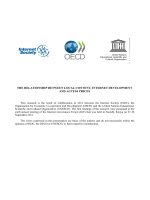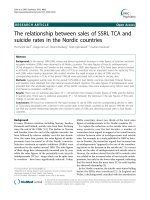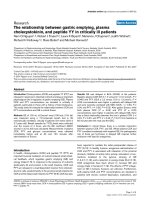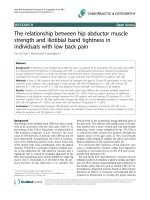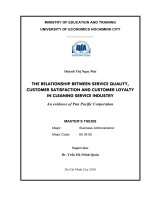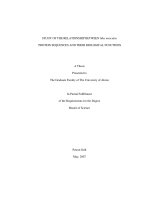The Relationship between Motivation to Use Airbnb and Guests- Rep
Bạn đang xem bản rút gọn của tài liệu. Xem và tải ngay bản đầy đủ của tài liệu tại đây (1.93 MB, 140 trang )
UNLV Theses, Dissertations, Professional Papers, and Capstones
August 2019
The Relationship between Motivation to Use Airbnb and Guests’
Repurchase Intention: Moderating Effect of Consideration Set
Wen Jiang
Follow this and additional works at: />Part of the Business Administration, Management, and Operations Commons, and the Marketing
Commons
Repository Citation
Jiang, Wen, "The Relationship between Motivation to Use Airbnb and Guests’ Repurchase Intention:
Moderating Effect of Consideration Set" (2019). UNLV Theses, Dissertations, Professional Papers, and
Capstones. 3729.
/>
This Thesis is protected by copyright and/or related rights. It has been brought to you by Digital Scholarship@UNLV
with permission from the rights-holder(s). You are free to use this Thesis in any way that is permitted by the
copyright and related rights legislation that applies to your use. For other uses you need to obtain permission from
the rights-holder(s) directly, unless additional rights are indicated by a Creative Commons license in the record and/
or on the work itself.
This Thesis has been accepted for inclusion in UNLV Theses, Dissertations, Professional Papers, and Capstones by
an authorized administrator of Digital Scholarship@UNLV. For more information, please contact
THE RELATIONSHIP BETWEEN MOTIVATION TO USE AIRBNB AND GUESTS’
REPURCHASE INTENTION: MODERATING EFFECT OF CONSIDERATION SET
By
Wen Jiang
Bachelor of Art – Recreation, Park and Tourism
San Francisco State University, 2010
A thesis submitted in partial fulfillment
of the requirements for the
Master of Science – Hotel Administration
William F. Harrah College of Hotel Administration
The Graduate College
University of Nevada, Las Vegas
August 2019
Thesis Approval
The Graduate College
The University of Nevada, Las Vegas
July 8, 2019
This thesis prepared by
Wen Jiang
entitled
The Relationship between Motivation to Use Airbnb and Guests’ Repurchase Intention:
Moderating Effect of Consideration Set
is approved in partial fulfillment of the requirements for the degree of
Master of Science – Hotel Administration
William F. Harrah College of Hotel Administration
Billy Bai, Ph.D.
Kathryn Hausbeck Korgan, Ph.D.
Examination Committee Chair
Graduate College Dean
Mehmet Erdem, Ph.D.
Examination Committee Member
Cass Shum, Ph.D.
Examination Committee Member
John Schibrowsky, Ph.D.
Graduate College Faculty Representative
ii
ABSTRACT
With the rise of the peer-to-peer sharing economy, Airbnb has become the leading
platform as an online marketplace that allows homeowners to contract short-term leases or rents
to tourists. It has expanded rapidly around the globe. This study comprehensively reviews
previous literature with respect to the marketing of Airbnb. The study then summarized and
categorized 12 motivators linked as causative agents for guests choosing Airbnb. Using the pushpull theory, along with research on the consideration set, this study examines the relationships
between Airbnb motivators and guests’ repurchase intention. This study further examines how
the consideration set moderates these relationships.
Seventy-eight Airbnb guests were surveyed using a paper-based survey questionnaire in a
pilot study. It shows that 13 factors were identified in principal component analysis. In the main
study, a sample of 397 complete usable surveys were collected from an online platform.
Supporting predictions, all motivators significantly predict repurchase intention. However,
contrary to predictions, consideration set did not moderate the relationship between motivators
and repurchase intention. The study’s theoretical and practical implications are discussed.
Keywords: Airbnb, motivators to use Airbnb, repurchase intention, consideration set.
iii
ACKNOWLEGEMENTS
I have been blessed throughout my master program at the University of Nevada, Las
Vegas (UNLV). The reason why I did this study is because I have always desired to do
something for my mentor and for the hospitality industry in return. Additionally, the idea for this
thesis was inspired from the conversations with my best mentor in the hospitality industry. He
complained that some clients were stolen by his hotel’s competitor, so I started to think what I
could do to help him.
I have been waiting a long time for this moment to express my deepest appreciation to
many people. My heart-felt gratitude goes to my committee chair, Dr. Billy Bai for giving me
endless guidance and support. He kept encouraging me when I met difficulties. It is my
tremendous fortune to have him as my chair. Also, I would like to express my sincere gratitude
to my committee member, Dr. Cass Shum, whose mentorship, time consuming, detailed
guidance and support were invaluable. Without Dr. Bai’s and Dr. Shum’s immense guidance, I
would neither finished this study nor begun my new journey at the next level. I was blessed to
have two outstanding committee members who helped to finish this study: Dr. Mehmet Erdem,
and Dr. John (Jack) Schibrowsky. I would like to thank, Dr. Ashok Singh for your suggestions in
statistics. Furthermore, I owe a great deal of thanks to Scott from UNLV writing center for
helping me proofread my thesis. I would also like to extend my thanks Dr. Raab, Dr. Belarmino,
Ankita, Ryan, and my classmates for helping me with my pilot study. Last but not the least, I
really want to thank my true friend OM, the most intelligent and well-educated person I have
ever known in my life. OM sacrificed his spare time to generously proofread my thesis. He
always offered prompt responses whenever I asked for his expertise.
iv
I would like to thank some people from the hospitality industry as well. Marriott
Internationals and BJQY hotel, offered me such good opportunities to be trained professionally
and to work in the industry. Jatin Khanna, Davis Rao, and Long Ma are my invaluable mentors
and friends, who have been always backing me up whenever I needed it. Also, many thanks to
my supervisors, managers and friends from when I used to work for the Mansion at MGM Grand
Las Vegas. Without these professional training and working experiences, I would not be able to
draw my inspiration for this study.
Special thanks to my parents, who have always been supportive me for chasing my
dreams. They gave me endless love and supports spiritually and financially. I would like to thank
my family for their love and back up. Lastly, my sincere appreciation to my lovely friends, Shuo
Yang, Zhou, Dongmei Zhang, Logan and Dave Brown. Thank you, Nicole Han, Adrianna Hong,
Yuanyuan Zhang, Leo Qin , Tiffany Huang, Michael and Jiang for your encouragements.
You raise me up!
v
TABLE OF CONTENTS
ABSTRACT ................................................................................................................................... iii
ACKNOWLEGEMENTS .............................................................................................................. iv
TABLE OF CONTENTS ............................................................................................................... vi
LIST OF TABLES .......................................................................................................................... x
LIST OF FIGURES ....................................................................................................................... xi
CHAPTER 1 ................................................................................................................................... 1
INTRODUCTION .......................................................................................................................... 1
Problem Statement .......................................................................................................................... 2
CHAPTER 2 ................................................................................................................................... 7
LITERATURE REVIEW ............................................................................................................... 7
Introduction ..................................................................................................................................... 7
Motivation ....................................................................................................................................... 7
Motivation Factors to Choose Airbnb........................................................................................... 10
Summary of Airbnb Motivators .................................................................................................... 19
Classification of Motivators of Airbnb ......................................................................................... 24
Customer Repurchase Intention .................................................................................................... 25
Effects of Intrinsic Motivators on Repurchase Intention .............................................................. 26
Effects of Extrinsic Motivators on Repurchase Intention. ............................................................ 30
Consideration Set .......................................................................................................................... 32
vi
Airbnb’s Guests’ Consideration Set.............................................................................................. 32
Antecedents and Consequences of Consideration Set .................................................................. 34
Cognitive Processing for Different Consideration Sets ................................................................ 35
The Moderating Role of Consideration on the Effect of Intrinsic Motivator ............................... 36
The Moderating Role of Consideration on the Effect of Extrinsic Motivator .............................. 39
Conceptual Framework ................................................................................................................. 41
Hypotheses .................................................................................................................................... 43
CHAPTER 3 ................................................................................................................................. 47
METHODLOGY .......................................................................................................................... 47
Pilot Study..................................................................................................................................... 47
Main Study .................................................................................................................................... 48
Sample........................................................................................................................................... 48
Survey Procedure .......................................................................................................................... 49
Independent Variables, Moderator, and Dependent Variables. .................................................... 50
Main Study Data Analysis Procedure ........................................................................................... 56
CHAPTER 4 ................................................................................................................................. 58
RESULTS ..................................................................................................................................... 58
Introduction ................................................................................................................................... 58
Pilot Study..................................................................................................................................... 58
Main Study Results ....................................................................................................................... 67
vii
Data Description ........................................................................................................................... 68
Consideration Set and Demographic Description ......................................................................... 68
Factor Analysis and Model Modification ..................................................................................... 71
Multiple Linear Regression Analysis............................................................................................ 74
The Moderating Effects Test ........................................................................................................ 80
Summary of Hypotheses Testing .................................................................................................. 84
Conclusion .................................................................................................................................... 85
CHAPTER 5 ................................................................................................................................. 86
DISCUSSION AND CONCLUSION .......................................................................................... 86
Overview ....................................................................................................................................... 86
Discussion of Major Findings ....................................................................................................... 87
Theoretical Implications ............................................................................................................... 90
Practical Implications.................................................................................................................... 94
Limitations .................................................................................................................................... 98
Future Studies ............................................................................................................................... 99
Conclusion .................................................................................................................................. 100
APPENDIX A ............................................................................................................................. 101
INFORMED CONSENT ............................................................................................................ 101
Survey of Airbnb guests.............................................................................................................. 102
Section 1: Qualifying questions .................................................................................................. 102
viii
Section 2: Regarding your recent stay with Airbnb .................................................................... 103
Section 3: Your intention to use Airbnb in the future ................................................................. 105
Section 4: Your demographics .................................................................................................... 106
Section 5: Your feedback on the survey ..................................................................................... 106
APPENDIX B ............................................................................................................................. 107
Comments from survey of Airbnb guests ................................................................................... 107
REFERENCES ........................................................................................................................... 108
CURRICULUM VITAE ............................................................................................................. 125
ix
LIST OF TABLES
Table 1. List of Factors that Motivated Guests to Choose Airbnb.……...................................20
Table 2. List of Factors that Motivated Guests to Choose Airbnb……....................................24
Table 3. Demographic Backgrounds of Airbnb Users .………………………………………49
Table 4. Intrinsic Motivators Analysis Scale………………………………………………….51
Table 5. Extrinsic Motivators Analysis scale .………………………………………………...54
Table 6. Purchase Intension Analysis Scale .………………………….………………………56
Table 7. Web Responsiveness quality Scale ……………………………...…………………..59
Table 8. Exploratory Factor Analysis -- Factor Loadings of the Independent Variables .…....63
Table 9. Demographic Backgrounds of Airbnb Users ..………………………………………67
Table 10. Demographic Profile from Survey Respondents ....…….………………………….69
Table 11. Descriptive Statistics of Repurchase Intention……………………………………..70
Table 12. Confirmatory Factor Analysis for Proposed Model I ………….……………...........73
Table 13. Multiple Linear Regression Analysis for the Repurchase Intention on Airbnb ...….78
Table 14. Summary of Hayes Marco Process for Consideration Set Moderator Variable ……82
Table 15. Summary of Hypotheses Testing Results…………………………………….…….84
x
LIST OF FIGURES
Figure 1. Average room price per night in selected major cities in January 2018..................12
Figure 2. Conceptual model…………………………………….............................................43
xi
CHAPTER 1
INTRODUCTION
In the contemporary hospitality industry, the sharing economy is booming (Guttentag &
Smith, 2017). Airbnb, the principal hospitality service in the sharing economy, is an online
marketplace that allows home-owners to lease or rent in the short-term to tourists (Guttentag,
2015). Founded in 2008, Airbnb has expanded rapidly around the globe, having the biggest
market share for lodging in the sharing economy. By the summer of 2016, more than onehundred million guests have used Airbnb (Chafkin & Newcomer, 2016; Guttentag, 2015).
Airbnb controls listings of over 2.3 million room inventories, giving it a market valuation of
approximately 30 billion dollars (Chafkin & Newcomer, 2016).
As an exemplar of the sharing economy, Airbnb has created a long-term threat to the
“traditional” hotel industry (Guttentag, Smith, Potwarka, & Havitz, 2018). Its room inventories
are more than the total room inventories of the three largest hotel companies combined (i.e.
Hilton, Marriott, and InterContinental) (Chafkin & Newcomer, 2016). Its market valuation is
thirty percent greater than that of the Hilton (Chafkin & Newcomer, 2016). Twenty-five percent
of leisure travelers and 23% of business travelers were expected to use Airbnb by the end of
2017 (Molla, 2017); while nearly two-thirds of Airbnb users reported having used the service as
a substitute for a standard hotel (Guttentag & Smith, 2017). The market share of Airbnb is
expected to continue growing, especially among travelers who are under 40 years old (Guttentag
& Smith, 2017). This market share is based on the percentage of total sales in the lodging
industry.
1
Problem Statement
To cope with this new competitor, hoteliers need to understand what contributes to the
continued success of Airbnb. Previous studies show that service quality and higher price value,
compared to hotel accommodations, are the top factors that contribute to its success (Guttentag,
2015; Guttentag et al., 2018). In particular, perceived price value is the main strength that Airbnb
employs to entice potential guests, and to induce existing guests to keep using the service
(Guttentag et al., 2018; Mao & Lyu, 2017). Despite the usefulness of price value analysis, other
factors, such as: location, sustainability, social interaction, and novelty play a role in influencing
guests’ choice when using Airbnb (Hamari, Sj€oklint, & Ukkonen 2016; Mody, Suess, & Lehto,
2017; Tussyadiah & Zach, 2015).
Compared with perceived price value, there are other critical factors that make Airbnb a
preferred choice among users. There are three main reasons for this. First, traditional hotels
suffer from a cost disadvantage when competing with Airbnb. Traditional hotels are required to
pay additional costs that do not apply to Airbnb hosts. Unlike traditional hotels, Airbnb hosts are
not required to comply with many legally mandated hotel operations, including occupancy tax,
safety, and fire codes, and liability insurance requirements (Edwards, 2013). Second, due to
various regulations and requirements, it is almost impossible for traditional hotels to match
Airbnb on price/economic value. For example, traditional hotels are required to maintain ADA
requirements, and to comply with local fire and safety codes (Llewellyn, 2014). Finally, previous
literature indicates that price and economic benefits are both less important than other motivators
(Lamb, 2011; Quinby & Gasdia, 2014). When interviewing budget travelers, Lamb (2011) found
that price or economic benefit is the primary motivator in no more than thirty percent of the total
bookings for accommodations. Factors such as: “authentic experience” and “close personal
2
connection” are the main considerations in the remainder of the bookings. Some studies have
indicated that a number of other factors, such as: location, homely feel, price/economic value,
sharing economy ethos, sustainability, electronic word of mouth, authenticity,
enjoyment/hedonic motivations, social influence/value, home benefits, and social
interactions/community have induced guests to choose Airbnb over traditional hotels ( Camilleri
& Neuhofer, 2017; Chu & Choi, 2000; Dolnicar & Otter, 2003; Guttentag & Smith, 2017;
Hamari et al., 2016; Johnson & Neuhofer, 2017; Liang, 2015; Mao & Lyu, 2017; Mody et al.,
2017; Poon & Huang, 2017; Satama, 2014; Tussyadiah & Pesonen, 2016; Tussyadiah & Zach,
2015; Yang & Ahn, 2016). As a result, it is necessary to identify the effects of various factors
that entice guests to purchase Airbnb.
Indeed, recent research shows that guests’ purchasing decisions can be influenced by a
complex suite of emotions that are both directly and indirectly related to decision-making
cognitive appraisals (Achar, So, Agrawal, & Duhachek, 2016). Because motivation can induce
individuals to behave in certain ways, this study addresses these questions, drawing from various
studies on motivation (Crompton, 1979; Dann, 1977, 1981). Existing literature classifies
motivation into two types: intrinsic and extrinsic (Crompton, 1979; Dann, 1977, 1981). Even
though existing studies have examined the effect of both intrinsic and extrinsic motivators on
Airbnb guests, they remain limited in two ways (Camilleri & Neuhofer, 2017; Chu & Choi 2000;
Dolnicar & Otter 2003; Guttentag & Smith, 2017; Hamari et al., 2016; Johnson & Neuhofer,
2017; Liang, 2015; Mao & Lyu, 2017; Mody, et al., 2017; Pesonen, 2016; Poon & Huang, 2017;
Tussyadiah & Satama, 2014; Tussyadiah & Zach, 2015; Yang & Ahn, 2016). One is that there is
no previous literature that categorizes motivators based on how they are defined; thus, there are
overload factors. For example, the sharing economy ethos suggested by Guttentag et al. (2018) is
3
similar to the sustainability concept suggested by Tussyadiah and Pesonen (2016), and Hamari et
al. (2016). When both the sharing economy ethos and the sustainability concept are considered,
these motivators can help decrease unnecessary waste and negative impacts on the environment.
With this in mind, the present study will attempt to classify existing motivators.
According to the push-pull theory, it is not enough to categorize all existing Airbnb
motivators into either intrinsic or extrinsic without further examining the effect of these
motivators on consumer behavior. Thus, this study examines the linkage between
intrinsic/extrinsic motivators and guest repurchase intention. The present study examines the
effect of motivators on guest repurchase intention because of three major reasons.
First, in order to improve future sales, business owners seek maximum favorable
repurchase intention due to the fact that repurchase intention is the key determinant for actual
buying behavior, and is directly related to future sales (Dodds, Monroe, & Grewal, 1991;
Morwitz, 2014). Since it costs approximately five times to attract new consumers compared to
the cost of retaining current consumers, repurchase intention will bring more benefits to business
entities.
Second, it is necessary to find out whether intrinsic or extrinsic motivators are the most
significant factors affecting repurchase intention. Some existing studies highlight the point that
the most significant effect on Airbnb guests’ repurchase intention is price/value (Lamb, 2011;
Morgan Stanley Research, 2016; Quinby & Gasdia, 2014; Tussyadiah, 2015). Based on the
outcomes, the present study can help business owners tailor their products and services. For
example, if the result shows that novelty is the motivator that has the most significant effect on a
guest’s repurchase intention, then hotel managers and Airbnb owners can improve the novelty of
their products and services in order to attract more potential guests.
4
Third, the present study applies its defined consideration set as the moderator for linkages
found between motivators and Airbnb guests’ repurchase intention. Since previous studies did
not test whether Airbnb guests considered booking accommodations from hotels as well, it can
be invalid to assume that all Airbnb guests are the same. Indeed, it is possible that Airbnb guests
considered booking from hotels first, and then decided to purchase accommodations using
Airbnb. On the other hand, certain Airbnb guests did not consider traditional hotels, and booked
directly from Airbnb. Imagine that a guest is facing a purchase decision having different levels of
complexity; he or she can be impacted by intrinsic and extrinsic motivators that affect their
decision to greater or lesser degree (Iyengar, Lepper, & Diener, 2000). This study applies
research on the consideration set, and examines the moderating roles of the consideration set on
the relationships between intrinsic/extrinsic motivators and repurchase intention. The importance
of addressing the consideration set in this study is to better help business owners attract potential
guests. For instance, the result clearly shows which motivator has a significant influence on those
Airbnb guests who considered booking their accommodations from hotels. Meanwhile, the result
also provides insights to Airbnb owners showing how they can improve their products and
services, especially for unstable guests. All in all, this research fills a gap by employing the pushpull theory to explain how factors behind Airbnb’s success fulfill intrinsic and extrinsic needs,
which in turn influence guests’ repurchasing intention. This research also focuses on the
consideration set, and examines the moderating role of the consideration set with regard to
guests’ decisions to purchase using Airbnb.
In summary, the purpose of this study will be three-fold: (a) use push-pull theory to
categorize motivators as intrinsic or extrinsic; (b) test the effect of intrinsic and extrinsic
motivators on guests’ repurchase intention, and (c) examine the moderating effect of the
5
consideration set on the linkages between motivators and guests’ repurchase intention. This
study makes three major contributions to the literature of push-pull theory, the consideration set,
the sharing economy in the lodging industry, as well as providing practice for hoteliers. From a
theoretical perspective, this study contributes to the influence on guests’ decision making by
understanding specific motivators that can induce Airbnb purchases. In order to attain the most
accurate and precise outcome, this study employs the consideration set to moderate the effect on
the linkages between motivators and repurchase intention. This study further applies push-pull
theory to categorize motivators, and to conduct a survey of guests who have booked their
accommodations using Airbnb. Thus, the study will show which factors induce guests to
purchase from Airbnb. It will also indicate the moderator effect of the consideration set on the
linkages between motivators and guests’ repurchase intention. In addition, this study is capable
of revealing factors that contribute to the success of Airbnb, and enables hotels to make
appropriate improvements. From a practical perspective, this study is beneficial to managers in
order to better understand the underlying motivators that affect their purchasing decisions. Thus,
traditional hotels will have more possibilities to compete with Airbnb in the marketing of the
lodging industry. By identifying the motivators of the Airbnb guests who have considered
booking accommodations from hotels, hoteliers are advised to pay attention to this group of
guests, and try to find substitute products and services that can attract these potential guests.
Also, by carefully identifying their guests’ motivators, both hotel managers and sharingeconomy companies can tailor their amenities to their clients based on their needs.
6
CHAPTER 2
LITERATURE REVIEW
Introduction
This chapter reviews previous studies regarding Airbnb guests’ motivation and the
consideration set that influences guest decision making. The first part of this chapter includes a
review on motivation theory, followed by a discussion on motivators that induce guests to
choose Airbnb. Drawing on the existing research on push-pull motivation theory, this study
classifies as intrinsic or extrinsic those motivators that guests use to choose Airbnb. The second
part of this chapter gives an overview of repurchase intention, consideration set, and how guest
decisions are affected by the above-mentioned motivators. After reviewing motivation theory,
categorizing motivators of Airbnb, studying repurchase intention and the consideration set, this
chapter proposes hypotheses.
Motivation
Motivation can be described as “the reasons underlying behavior” (Guay et al., 2010, p.
712). The process that leads people to behave in a certain way (Jansson-Boyd, 2010). Motivation
has been shown to be an important factor behind consumer decisions to purchase a product
(Smith, 1954). In addition, motivation has been classified into two types: (a) extrinsic, and (b)
intrinsic (Calder & Staw, 1975; Deci, 1971, 1972; Pinder, 1976; Porac & Meindl, 1982;
Pritchard, Campbell, & Campbell, 1977; Scott, Farh, & Podsakoff, 1988). Intrinsic motivation
refers to the individual’s inherent desire to do something for his or her own sake, while push
factors, as a source of extrinsic motivation, are defined as the expected outcomes or values that
drive individuals to perform certain activities. Extrinsic motivation is defined as the external
factors that drive an individual to perform certain activities (Crompton, 1979; Dann, 1977,
7
1981). These external factors are disparate from the activity itself, and include such things as:
improved job performance, pay, and promotions (Lawler & Porter, 1967; Mitchell & Biglan,
1971; Vroom, 1964). The perceived usefulness in using a computer can be classified as an
extrinsic motivation (Davis, Bagozzi, & Warshaw, 1992). In contrast, intrinsic motivation refers
to the performance and the process of an activity, including factors such as the enjoyment of
using a computer (Berlyne, 1966; DeCharms, 1968; White, 1959).
To better understand motivation of Airbnb guests, it is necessary to review push-pull
theory in the hospitality industry. One of the most commonly used theories to examine
consumers’ motivation in the hospitality and tourism research is push-pull theory (Crompton,
1979; Dann, 1977, 1981). It is popular because of its simplicity in distinguishing motivators as
either intrinsic or extrinsic; these can lead an individual to behave in a particular way. Push
factors are defined as sources of intrinsic motivation referring to the individual’s inherent desire
to do something for his or her own sake, while pull factors are defined as source of extrinsic
motivation referring to the expected outcomes or values that drive individuals to perform certain
activities (Crompton, 1979; Dann, 1977, 1981; Gnoth 1977, Uysal & Jurowski 1994). For
instance, Dann has identified “escape” as the push factor of tourists that is the greatest reason to
travel. Dann explained that escape means that tourists want to run away from familiar and
common-place situations, such as: the job, the boss, the customer, the commute, the house, the
lawn, the leaky faucets (Dann, 1977). On the other hand, pull factors are identified as motives,
and they are identified to be the desirable features of the destination, such as: sunshine, relaxed
tempo, and friendly natives. During the two weeks in the summer, the sun and sea attracted
millions of North American tourists (Dann, 1981). Based on the above discussion, the push
factor refers to intrinsic motivators, while the pull factor refers to extrinsic motivators.
8
Existing literature for studying intrinsic and extrinsic motivations focuses on business in
general, such as: consumer behavior in retail contexts, or work and school performance based on
the ground theories proposed by Berlyne (1966), DeCharms (1968), and White (1959). Only a
few exceptional studies investigated and classified both intrinsic and extrinsic motivators
behinds customers’ choices in the hotel industry. Studies performed on consumers’ motivators in
general business did not list the features related to the hotels or resorts that could attract
consumers.
However, the literature of consumers’ motivators in the hotel industry highlighted both
the tangible and intangible amenities related to the hotels or resorts that can consistently attract
consumers. The products or services from hotels are different from other products selling in
markets because intangible assets distinguish hotels as experience-dominant service contexts
(Shaw, Bailey, &Williams, 2011).
Related to push factors, uniqueness-seeking (Wang, Luo, & Tang, 2015), interpersonal
experience (Wang et al., 2015), social networking (Wang et al., 2015), health trends (Damijanić
& Luk, 2017), relaxation and award (Damijanić & Luk, 2017), novelty (Damijanić & Luk,
2017), homely atmosphere (Gunasekaran & Anandkumar, 2012), local touch (Gunasekaran &
Anandkumar, 2012), and guest-host relationships (Gunasekaran & Anandkumar, 2012) have
been shown to be associated to intrinsic motivators that induce guests to purchase from sources,
which include boutique hotels, wellness hotels, and alternative accommodations. In the context
of wellness hotels, some authors explained three intrinsic motivators for better understanding:
health trends that represent the inner desire to improve one’s health, relaxation as an individual’s
desire to de-stress in a peaceful place, and as a reward for their hard work, novelty that refers to
the desire to try something new (Damijanić & Luk, 2017). The alternative accommodation refers
9
to established locations, such as: service apartments, commercial homes, and guest houses that
provide paid lodging to the tourists on short-term bases (Gunasekaran & Anandkumar, 2012).
Related to pull factors, decoration and theme (Wang et al., 2015), site value (Wang et al.,
2015), value for money (Gunasekaran & Anandkumar, 2012), entertainment and recreation
(Damijanić & Luk, 2017), and cultural and natural heritage (Damijanić & Luk, 2017) have been
found associated to extrinsic motivators that led consumers to purchase from either patronize
boutique hotels, or wellness hotels, or alternative accommodation. Authors have pointed to the
value of money, such as: better price than hotel, local experience, ready availability, positive
online reviews, and personalized hospitality in Indian alternative accommodation (Gunasekaran
& Anandkumar, 2012).
The above literature contributes to our understanding of consumers’ motivation in
general, and in particular to the hospitality industry, with clear definitions and explanations of
both intrinsic and extrinsic motivators. However, limited research has applied push-pull theory
to investigate both intrinsic and extrinsic motivators of Airbnb guests. Although Guttentag,
Smith, Potwarka, and Havitz, (2018) examined the motivators of Airbnb guests through five
clusters, they did not study all possible factors. Therefore, this study applies push-pull theory to
categorize all Airbnb motivators that have been identified in the existing literature. Because the
above-reviewed literature does not clearly address the factors that motivate guests to choose
Airbnb, the present study intends to broaden the knowledge base by focusing on Airbnb’s guests’
motivation factors.
Motivation Factors to Choose Airbnb
Facing the rapid success of Airbnb in the lodging industry, it is necessary for hoteliers to
better understand what factors motivate guests to choose Airbnb. Specifically, Airbnb is an
10
online marketplace and hospitality service that allows homeowners to lease or rent in the shortterm to tourists (Guttentag, 2015). It has the biggest market share for lodging in the sharing
economy, and has expanded rapidly around the globe (Chafkin & Newcomer, 2016; Guttentag &
Smith, 2017). Guttentag et al. (2018) analyzed “both the internal drives that inspire someone to
travel (push factors) and the particular characteristics of a certain travel product that persuade the
traveler to choose it (pull factors).” Previous studies identified the following twelve factors that
contribute to the success of Airbnb. A number of factors have been identified that affect Airbnb
guests’ repurchase intention:
Financial rewards. The term financial rewards refers to both direct and indirect rewards
that Airbnb guests can obtain financially. Financial rewards can be reflected in two factors,
namely price value/economic benefit and home benefits. Price value/economic benefits is
identified as consumers’ cognitive tradeoff between the perceived benefits of the products and
services and the monetary cost for using them (Venkatesh, Thong, & Xu, 2012). The term home
benefits refers to the larger space to rent, and access to household amenities. Home benefits are
found to be the third motivation in choosing Airbnb (Guttentag & Smith, 2017; Morgan Stanley
Research, 2016). Guttentag et al. (2018) stated that the main home benefits are larger space and
access to household amenities, while a homely feel refers to benefits that guests expect to fulfill
by staying at Airbnb. Indeed, the above two factors are direct and indirect financial rewards to
Airbnb guests. For example, price value/economic benefit is a direct monetary reward for Airbnb
guests; this includes offering the same sized room with a lower rate in the same area (Forgacs &
Dimanche, 2016). On the other hand, home benefits are indirect financial rewards for Airbnb
guests, such as: offering kitchen or laundry facilities for free (Morgan Stanley Research, 2016).
11
There is extensive literature studying the motivations of Airbnb guests that acknowledges
price (economic benefits) as the primary motivator driving guests to choose Airbnb (Morgan
Stanley Research, 2016; Lamb, 2011; Quinby & Gasdia, 2014; Tussyadiah, 2015). In general,
the search for monetary benefits has been found to be one of the primary extrinsic rewards for
staying in peer-to-peer accommodations (Bellotti, Ambard, Turner, Gossmann, Demkova, &
Carroll, 2015; Botsman & Rogers, 2011; Gansky, 2010; Lamberton & Rose, 2012; Möhlmann,
2015). Forgacs and Dimanche (2016) confirm that Airbnb can provide accommodations at more
competitive prices than traditional hotels. This primary motivator also applies to other companies
employing similar sharing economy models, such as Uber and Lyft. This price motivator
definitely lures a significant percentage of guests away from traditional hotels. McCarthy (2018)
compiled a data chart from eight major tourist destinations around the world that clearly displays
Airbnb’s advantageous price (or economic benefits) compared to traditional hotels. Figure 1 is a
data chart displaying Airbnb’s advantageous price (or economic benefits) compared to traditional
hotels.
Figure 1. Average room price per night in selected major cities in January 2018. Adapted from “
Is Airbnb Really Cheaper Than A Hotel Room?,” by N. McCarthy, 2018, Forbes, Retrieved from
/>12
Recent literature, however, argues that Airbnb rates are actually higher than hotel rates in
many destinations (Lane & Woodworth, 2016). Guttentag and Smith (2017) proposed the
following explanations for this price discrepancy: (a) Airbnb serves a broader market than
traditional hotels; (b) Traditional hotel and Airbnb markets have a limited number of overlapping
guests, even though they both offer diverse products and services; (c) Airbnb rentals can offer
units having more than two rooms, whereas, for the same price, traditional hotels only offer one
room; (d) Traditional hotel room rates are frequently found to be more expensive in some of
Airbnb’s biggest destination markets, causing guests to falsely believe that Airbnb’s room rates
are always cheaper than those of hotels. This indicates the need to explore other factors that
contribute to the success of Airbnb, which would allow traditional hotels to replicate Airbnb’s
success and compete with this new rival. Guttentag et al. (2018) identified larger space and
access to household amenities as major home benefits. These benefits clearly display the
uniqueness of Airbnb accommodations when compared to traditional hotels. Thus, Baker (2014)
and Grant (2013) thought that traditional hotels cannot compete with the unique aspect of Airbnb
accommodations. Survey results for both U.S. and European Airbnb users highlight the
importance of having one’s “own kitchen” (Morgan Stanley Research, 2016).
Local authenticity. Local authenticity is defined as the ability for guests to
experience authentic local lifestyles in diversified locations offered by Airbnb. Local authenticity
can be reflected in two factors: location and authenticity/local authenticity. Locations is
identified as accommodations that are located in diverse areas of a particular market having
unique ambiance and surroundings (Guttentag & Smith, 2017; Tussyadiah & Zach, 2015).
Authenticity/Local authenticity is identified as the desire to share real life experiences of places
visited, or at least to see life as it is really lived (MacCannell, 1973, p. 594). Airbnb guests were
13


